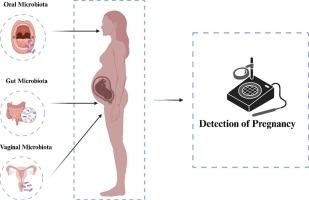超越HCG测试:基于微生物组的妊娠诊断。
IF 2.9
3区 医学
Q2 MEDICAL LABORATORY TECHNOLOGY
引用次数: 0
摘要
怀孕和体内微生物群之间复杂但明确的关系为新的诊断技术提供了重要的机会。这项工作提出了一种新的诊断方法,该方法与妊娠早期发生的肠道、阴道和口腔微生物群组成的显著变化相关。主要前提是通过描述这些微生物生态系统的周期性变化,确定那些与早孕密切相关的微生物指标。这些生物标志物作为高度敏感和精确的指标,可能使早期和精确的妊娠识别成为可能。更重要的是,了解各种器官中微生物群影响妊娠结局的基本过程,定制治疗以增强母亲和胎儿的健康可能被视为一个长期目标。阴道拭子或唾液分析是一种非侵入性的方法,可能会改变产前护理。医疗保健专业人员可能会监测妊娠进展,了解并减轻预期的问题,并通过识别早期妊娠指标采取及时措施。发现基于微生物组的妊娠并发症指标也可能使早期识别高危患者并实施个性化治疗计划成为可能。我们可能会对怀孕的复杂性有新的认识,并通过利用人类微生物群的潜力,创造出创造性的方法来增强母亲和孩子的健康。本文章由计算机程序翻译,如有差异,请以英文原文为准。

Beyond the hCG test: Microbiome-based diagnosis of pregnancy
The complex but definitive relationship between pregnancy and the body microbiota offers a significant opportunity for novel diagnostic techniques. This work proposes a new diagnostic method that correlates the significant changes in the gut, vaginal, and oral microbiota composition that occur in the early stages of pregnancy. The main premise is identification of those microbial indicators that are strongly linked to early pregnancy by describing the periodic shifts in these microbial ecosystems. Early and precise pregnancy identification may be made possible by these biomarkers' potential as highly sensitive and precise indicators. More importantly, an understanding of the fundamental processes by which the microbiota in various organs affects pregnancy outcomes, tailored therapies to enhance the health of both the mother and the fetus may be considered as a long-term goal. Analysis of vaginal swabs or saliva is proposed as a non-invasive method that might transform prenatal care. Healthcare professionals might monitor pregnancy progress, understand and mitigate the expected problems, and initiate prompt measures by identifying early pregnancy indicators. Finding microbiome-based indicators of pregnancy complications may also make it possible to identify at-risk patients early and implement individualized treatment plans. We may get fresh understanding of the intricacies of pregnancy and create creative methods to enhance the health of both mothers and children by utilizing the potential of the human microbiome.
求助全文
通过发布文献求助,成功后即可免费获取论文全文。
去求助
来源期刊

Clinica Chimica Acta
医学-医学实验技术
CiteScore
10.10
自引率
2.00%
发文量
1268
审稿时长
23 days
期刊介绍:
The Official Journal of the International Federation of Clinical Chemistry and Laboratory Medicine (IFCC)
Clinica Chimica Acta is a high-quality journal which publishes original Research Communications in the field of clinical chemistry and laboratory medicine, defined as the diagnostic application of chemistry, biochemistry, immunochemistry, biochemical aspects of hematology, toxicology, and molecular biology to the study of human disease in body fluids and cells.
The objective of the journal is to publish novel information leading to a better understanding of biological mechanisms of human diseases, their prevention, diagnosis, and patient management. Reports of an applied clinical character are also welcome. Papers concerned with normal metabolic processes or with constituents of normal cells or body fluids, such as reports of experimental or clinical studies in animals, are only considered when they are clearly and directly relevant to human disease. Evaluation of commercial products have a low priority for publication, unless they are novel or represent a technological breakthrough. Studies dealing with effects of drugs and natural products and studies dealing with the redox status in various diseases are not within the journal''s scope. Development and evaluation of novel analytical methodologies where applicable to diagnostic clinical chemistry and laboratory medicine, including point-of-care testing, and topics on laboratory management and informatics will also be considered. Studies focused on emerging diagnostic technologies and (big) data analysis procedures including digitalization, mobile Health, and artificial Intelligence applied to Laboratory Medicine are also of interest.
 求助内容:
求助内容: 应助结果提醒方式:
应助结果提醒方式:


